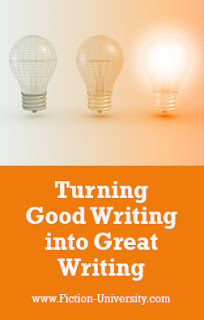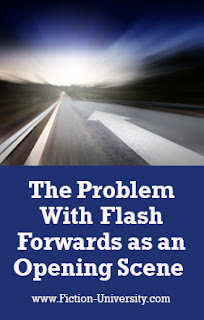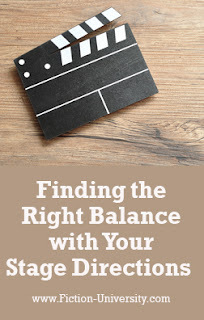Janice Hardy's Blog, page 8
November 2, 2023
Turning Good Writing into Great Writing
 By Janice Hardy, @Janice_Hardy
By Janice Hardy, @Janice_Hardy The first words you write aren’t always the right words to use.
Tuesday, I spent at least a half hour writing one line—and it wasn’t an opening line. I was working on a new scene for my science fiction detective novel, and it’s an emotion-packed scene right after the Dark Moment that tacks onto the All Is Lost Moment. It’s one those “this is where the protagonist reveals secrets they’d been keeping from someone important in their life, and it goes badly” situations.
I reached the end of the scene and had my upset character storm off, and then dropped the last line of the chapter.
I knew the final line was the right way to end, but it just felt meh.
I also knew the action lines leading up to it were the right ones, but they also felt meh.
Continue ReadingWritten by Janice Hardy. Fiction-University.com
Published on November 02, 2023 06:06
October 25, 2023
The Faceless Villain: What to do When Your Protagonist Is the "Bad Guy"
 By Janice Hardy, @Janice_Hardy
By Janice Hardy, @Janice_Hardy Not every story has a villain at its center—sometimes the problem is the protagonist.
For a lot of writers, the hardest-to-write conflict is the Person vs. Self conflict. Quite often, the antagonist is a physical being the protagonist can physically fight. But in a PvS conflict, there's no one plotting against the protagonist. The antagonist is something to overcome, such as depression, or grief, or a self-destructive streak that’s core to who the protagonist is and a flaw they need to fix by the end of the novel.
These stories are more challenging, but there’s no “Big Bad Guy” causing all the trouble.
But like any good conflict, even if your protagonist is dealing with a difficult personal issue, they'll still have an external antagonist to reckon with. Continue ReadingWritten by Janice Hardy. Fiction-University.com
Published on October 25, 2023 04:36
October 18, 2023
When Stuck in a Scene, Look Around
 By Janice Hardy, @Janice_Hardy
By Janice Hardy, @Janice_Hardy Sometimes the answer to making a scene work is inside the scene itself.
I’ve been struggling with a major turning point chapter revision the past week, and one scene was really giving me a headache. It’s the end of Act Two, and the scene that triggers my protagonist’s Dark Night of the Soul and All Is Lost moments. So yeah, it’s important.
What’s worse, is that I knew how the chapter needed to end (because of those oh-so-critical moments), I just wasn’t sure how to get there based on where the story was after all the new revisions. I had to connect Point A with Point B, mixing the original mystery plot with the new personal subplot I’d added.
This scene depended on my protagonist getting face-to-face with the antagonist’s minion and realizing something world-shattering about himself and the Big Problem of the plot. And after all the revising I’d done, I had no idea why that minion was in the scene now.
Continue ReadingWritten by Janice Hardy. Fiction-University.com
Published on October 18, 2023 04:55
October 4, 2023
3 Places Told Prose Likes to Hide
 By Janice Hardy, @Janice_Hardy
By Janice Hardy, @Janice_Hardy Told prose can steal the oompf from your story and make readers want to skim.
As a science fiction and fantasy writer, I was guilty of a lot of telling in my early work. I’d infodump, I’d write pages of backstory, I’d explain how rules worked and which gods did what to whom. It was a total mess.
But as my writing improved, I discovered how helpful showing could be. It let me put all those wonderful details I’d created into the scene without having to explain them. It let me suggest the backstories and create layered, nuanced characters. It let me background the description and not write boring paragraph after paragraph on what something looked like.
Continue ReadingWritten by Janice Hardy. Fiction-University.com
Published on October 04, 2023 06:26
September 19, 2023
Did You Choose the Best Words to Describe Your Setting?
 By Janice Hardy, @Janice_Hardy
By Janice Hardy, @Janice_HardyYour reader doesn’t know what you’re picturing when you write a scene. Make sure they see what you see.
Setting is a vital component of a novel, but it's one of the more awkward things to write naturally. People don't stop and describe the landscape, so having characters who do can feel forced and knock a reader right out of the story.It gets even more complicated when you think about how pretty much every scene needs its setting described so readers know where they are. But if you over describe, or use the wrong details, readers can get bored and start skimming, or get confused and stop reading.
In a critique, such descriptions often get feedback such as: "The setting didn't feel real to me" or "I never felt grounded in this world" or even "I just never connected to the character."
Continue ReadingWritten by Janice Hardy. Fiction-University.com
Published on September 19, 2023 05:36
Did You Choose the Best Words to Describe Your Setting
 By Janice Hardy, @Janice_Hardy
By Janice Hardy, @Janice_HardyYour reader doesn’t know what you’re picturing when you write a scene. Make sure they see what you see.
Setting is a vital component of a novel, but it's one of the more awkward things to write naturally. People don't stop and describe the landscape, so having characters who do can feel forced and knock a reader right out of the story.It gets even more complicated when you think about how pretty much every scene needs its setting described so readers know where they are. But if you over describe, or use the wrong details, readers can get bored and start skimming, or get confused and stop reading.
In a critique, such descriptions often get feedback such as: "The setting didn't feel real to me" or "I never felt grounded in this world" or even "I just never connected to the character."
Continue ReadingWritten by Janice Hardy. Fiction-University.com
Published on September 19, 2023 05:36
The Problem With Flash Forwards as an Opening Scene
 By Janice Hardy, @Janice_Hardy
By Janice Hardy, @Janice_HardyIf you have to flash forward to hook a reader, you’re not starting in the right place.
I admit, flash forwards are a big pet peeve of mine. I find them awkward and pointless, because they’re trying to get me interested in “an exciting part” of the story without doing any work to actually create that emotional connection. Obviously, taste vary, but for me, they’re a trick, a bait and switch, and they fail more times than work.
For those unfamiliar with the term, a flash forward is a device that starts with a scene from later in the story, then jumps back in time to show how the characters ended up in that situation. On TV shows, it’s the “twenty-four hours earlier” text that shows up after the opening scene where we see the hero in dire straits.
Continue ReadingWritten by Janice Hardy. Fiction-University.com
Published on September 19, 2023 03:53
September 11, 2023
Decisions, Decisions: Creating Character Choices That Matter
 By Janice Hardy, @Janice_Hardy
By Janice Hardy, @Janice_Hardy
A plot is just the series of choices a character makes in a story.
Making a decision is one of the most important things your characters will ever do. Not only does it drive the plot, it creates tension and unpredictability in the story. Readers turn the page to see what happens next, and decisions are all about the "next."
But there's a catch.
Readers have to care about the outcome of that choice.
“Should I have the eggs or the cereal?” is a choice, but no one is going to stay up late to see how that turns out. Because the other half of choosing is the fear that you're making the wrong choice.
(Here’s more with The Impossible Choice: A Surefire Way to Hook Your Readers)
Now, here's where it gets tricky.
Continue ReadingWritten by Janice Hardy. Fiction-University.com
Published on September 11, 2023 02:01
September 4, 2023
Three Questions to Get to the Heart of Your Story
 By Janice Hardy, @Janice_Hardy
By Janice Hardy, @Janice_Hardy The story is why readers picked up your book.
Writing is such a strange thing. As writers, we get these characters and stories in our heads and put them down on paper. Sometimes we know exactly what happens and write what we imagine, other times we have a character shouting in our heads and we transcribe what they tell us. We all have different processes and write with different voices.
What I find interesting, is that no matter what genre we write in or what age group we write for, one thing stays the same.
The story.
Not the plot, not the series of events that unfold, but the story that causes those events to happen as they do. Because story is bigger than plot or any of the other mechanical and technical aspects of writing. It’s the heart and soul of an idea and what brings the reader along for the ride.
Continue ReadingWritten by Janice Hardy. Fiction-University.com
Published on September 04, 2023 03:30
August 30, 2023
Finding the Right Balance with Your Stage Directions
 By Janice Hardy, @Janice_Hardy
By Janice Hardy, @Janice_Hardy Awkward stage direction can turn an otherwise good scene into a clunky mess, but the right balance of action and character thought lets the reader sail on through.
No matter what type of novel you’re writing, at some point you’ll have to describe how the characters move about and interact with the world—the stage direction. Like the theater, you’re directing how your “actors” move on the stage (or the page in this case).
Sometimes the direction is basic, such as “she walked across the room.” Other times, it’s a complicated fight scene involving six guys and an eight-legged monster. Or it’s a show of emotion, such as when someone “curls into a ball and cries.”
Continue ReadingWritten by Janice Hardy. Fiction-University.com
Published on August 30, 2023 03:30



